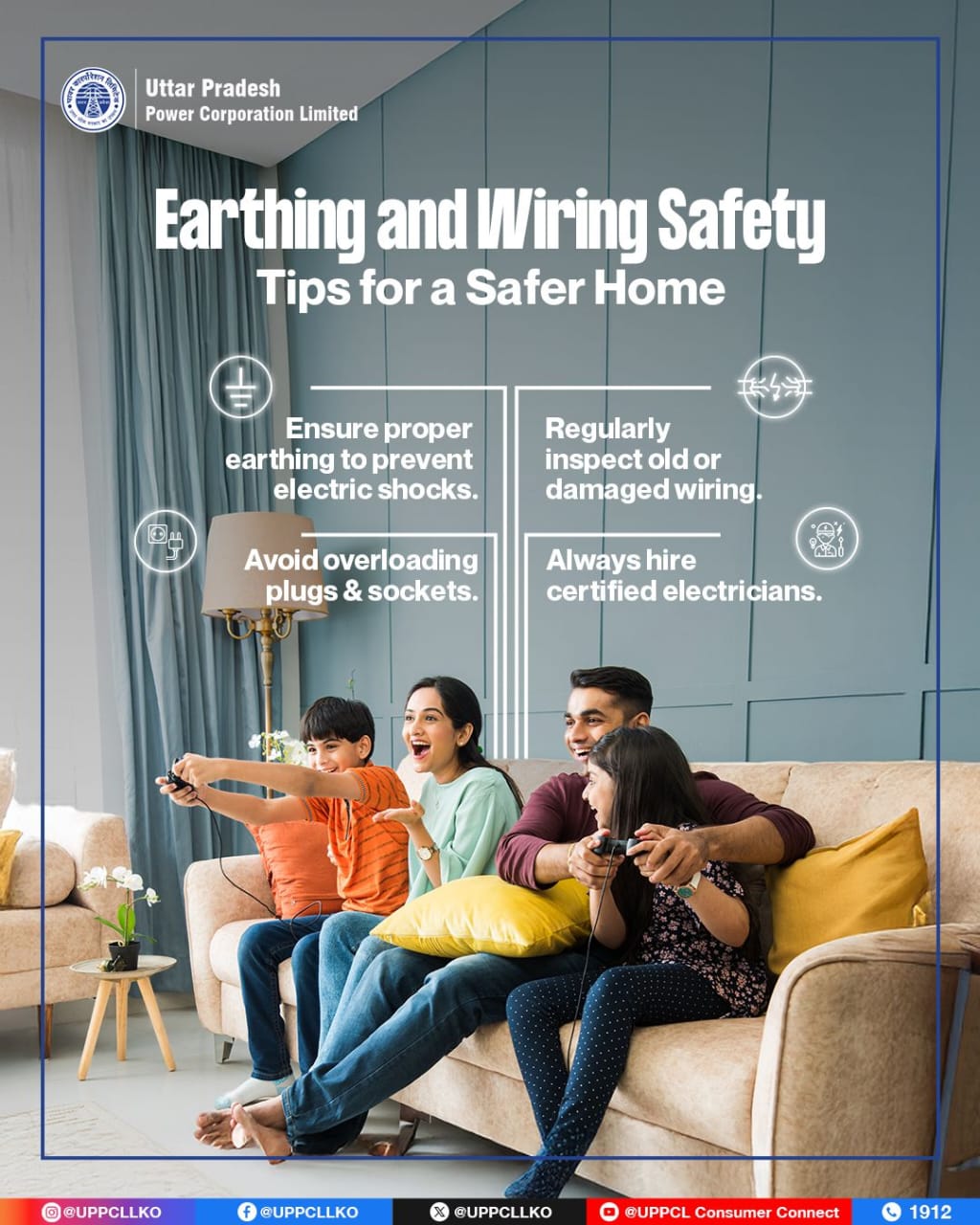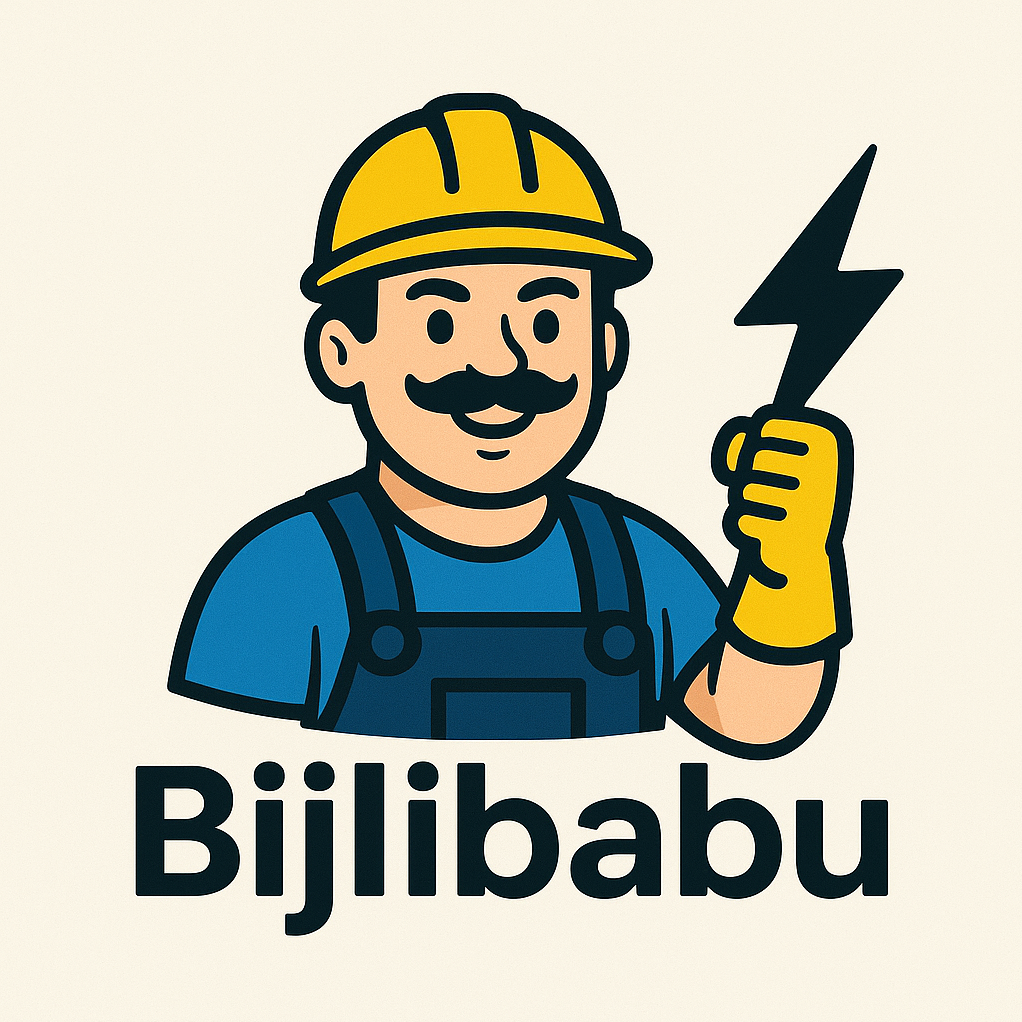बिजली का झटका जानलेवा है! घर में सुरक्षित रहने के 20+ विस्तृत उपाय
बिजली हमारे जीवन का अहम हिस्सा है। पंखे से लेकर मोबाइल चार्जर तक, हमारे लगभग सभी काम बिजली पर ही निर्भर हैं। लेकिन छोटी सी लापरवाही भी इसे जानलेवा बना सकती है। हर साल भारत में हजारों लोग बिजली के झटके (Electric Shock) और दुर्घटनाओं में अपनी जान गंवा देते हैं।
"सावधानी हटी, दुर्घटना घटी" – यह कहावत बिजली के मामले में सटीक बैठती है। हम आपकी सुरक्षा को सबसे ज्यादा महत्व देते हैं। इसलिए हम आपके लिए लाए हैं 20+ बिजली सुरक्षा नियम, जिन्हें अपनाकर आप अपने परिवार और खुद को सुरक्षित रख सकते हैं।
घर के अंदर सुरक्षा नियम
- कटे-फटे तार न इस्तेमाल करें: टेप लगे या टूटे तार तुरंत बदलें।
- एक सॉकेट, एक उपकरण: मल्टी-प्लग में कई भारी उपकरण लगाना आग का कारण बन सकता है।
- गीले हाथों से न छुएं: स्विच या उपकरण को गीले हाथों से कभी न छुएं।
- ISI-mark वाले उपकरण खरीदें: तार, स्विच और उपकरण हमेशा ISI-mark वाले ही खरीदें।
- सही अर्थिंग: घर में Earth connection सही होना चाहिए। यह करंट लीक होने पर सुरक्षा देता है।
- MCB और RCCB लगवाएं: ओवरलोड और करंट लीक से सुरक्षा के लिए।
पानी और बिजली – जानलेवा संयोजन
- Bathroom में उपकरण: हेयर ड्रायर का इस्तेमाल केवल फर्श सूखा होने पर करें।
- Kitchen सुरक्षा: सिंक के पास उपकरणों को पानी से दूर रखें।
- गीले उपकरण: अगर उपकरण पानी में गिर जाए, तो पहले main switch बंद करें।
बच्चों और बुजुर्गों की सुरक्षा
- Socket covers: निचले सॉकेट्स को cover करें।
- तार पहुंच से दूर रखें: मोबाइल चार्जर या अन्य तार लटकते हुए न छोड़ें।
- शिक्षा दें: बच्चों को बिजली के खंभों और तारों से दूर रहने की जानकारी दें।
घर के बाहर और बरसात में सुरक्षा
- Gire wires से दूरी: बिजली का तार टूटकर गिरने पर 10 फीट की दूरी बनाए रखें।
- Khambhe और transformer: कभी भी न छुएं।
- पतंग उड़ाते समय सावधानी: बिजली लाइनों के पास पतंग न उड़ाएं।
आपात स्थिति (Emergency) में क्या करें?
Electric Shock Case:
- पीड़ित को सीधे न छुएं: सूखी लकड़ी या प्लास्टिक की मदद से अलग करें।
- Main switch बंद करें: बिजली पूरी तरह काट दें।
- Doctor को तुरंत कॉल करें: EMS या नजदीकी हॉस्पिटल को सूचित करें।
Electrical Fire:
- पानी से बचें: कभी भी बिजली से लगी आग पर पानी न डालें।
- Fire extinguisher: Class C rated उपयोग करें।
- Evacuate: सभी लोगों को सुरक्षित स्थान पर ले जाएं।
MCB, RCCB और Earthing
- MCB: Overload होने पर बिजली काट देता है।
- RCCB/ELCB: Earth leakage होने पर बिजली तुरंत कट जाती है।
- Earthing: करंट को सुरक्षित रूप से जमीन में भेजता है।
FAQs
- MCB और RCCB में अंतर क्या है? MCB ओवरलोड से सुरक्षा करता है, RCCB करंट लीक से।
- Earthing क्यों जरूरी है? बिजली का करंट सीधे जमीन में भेजकर झटके से बचाता है।
- क्या बिजली से लगी आग में पानी डाल सकते हैं? नहीं, Class C extinguisher या रेत/मिट्टी का प्रयोग करें।
निष्कर्ष
बिजली के साथ सुरक्षा आपकी पहली प्राथमिकता होनी चाहिए। ऊपर दिए गए नियम और टिप्स अपनाकर आप अपने परिवार और खुद को सुरक्षित रख सकते हैं।
इस महत्वपूर्ण जानकारी को अपने दोस्तों और परिवार के साथ शेयर करें। आपकी एक शेयर किसी की जान बचा सकती है।

Electric Shock is Fatal! 20+ Detailed Tips to Stay Safe at Home
Electricity is an essential part of our lives. From fans to mobile chargers, almost all our tasks depend on electricity. But even a small act of negligence can make it deadly. Every year in India, thousands of people lose their lives to electric shocks and accidents.
"A moment of carelessness can lead to a lifetime of regret" – this saying fits perfectly when it comes to electricity. We prioritize your safety above all. That's why we've brought you 20+ electrical safety rules that you can adopt to keep yourself and your family safe.
Indoor Safety Rules
- Do not use frayed or damaged cords: Replace taped or broken wires immediately.
- One socket, one appliance: Plugging multiple heavy appliances into a multi-plug can cause a fire.
- Do not touch with wet hands: Never touch switches or appliances with wet hands.
- Buy ISI-marked appliances: Always buy wires, switches, and appliances with an ISI mark.
- Proper Earthing: The earth connection in your house must be correct. It protects against current leakage.
- Install MCB and RCCB: For protection against overload and current leakage.
Water and Electricity – A Deadly Combination
- Appliances in the Bathroom: Use hair dryers only when the floor is dry.
- Kitchen Safety: Keep appliances like mixers and toasters away from water near the sink.
- Wet Appliances: If an appliance falls into water, turn off the main switch first before touching it.
Safety for Children and the Elderly
- Socket covers: Cover the lower sockets.
- Keep wires out of reach: Do not leave mobile charger or other cords dangling.
- Educate them: Inform children to stay away from electric poles and wires.
Outdoor and Monsoon Safety
- Distance from fallen wires: Maintain a distance of 10 feet from a fallen power line.
- Poles and transformers: Never touch them.
- Kite flying precautions: Do not fly kites near power lines.
What to do in an Emergency?
Electric Shock Case:
- Do not touch the victim directly: Use a dry piece of wood or plastic to separate them.
- Turn off the main switch: Cut off the power completely.
- Call a doctor immediately: Inform EMS or the nearest hospital.
Electrical Fire:
- Avoid water: Never use water on an electrical fire.
- Fire extinguisher: Use a Class C rated extinguisher.
- Evacuate: Move everyone to a safe location.
MCB, RCCB, and Earthing
- MCB: Cuts off power during an overload.
- RCCB/ELCB: Immediately cuts off power in case of an earth leakage.
- Earthing: Safely sends current into the ground.
FAQs
- What is the difference between MCB and RCCB? MCB protects against overload, while RCCB protects against current leakage.
- Why is earthing important? It protects from electric shock by sending the current directly into the ground.
- Can you use water on an electrical fire? No, use a Class C extinguisher or sand/dirt.
Conclusion
Safety with electricity should be your first priority. By adopting the 20+ rules and tips mentioned above, you can keep yourself and your family safe.
Share this important information with your friends and family. Your one share could save someone's life.

